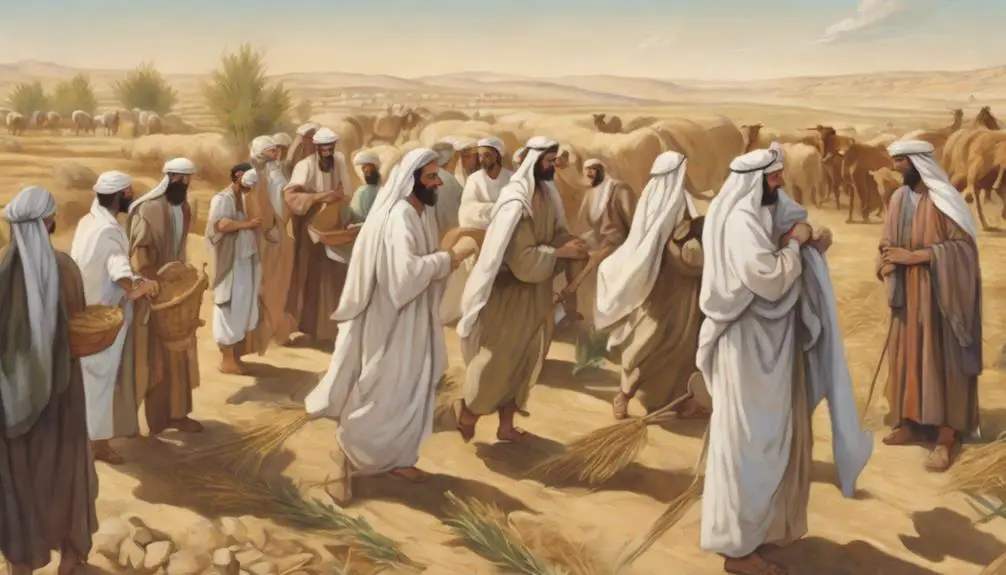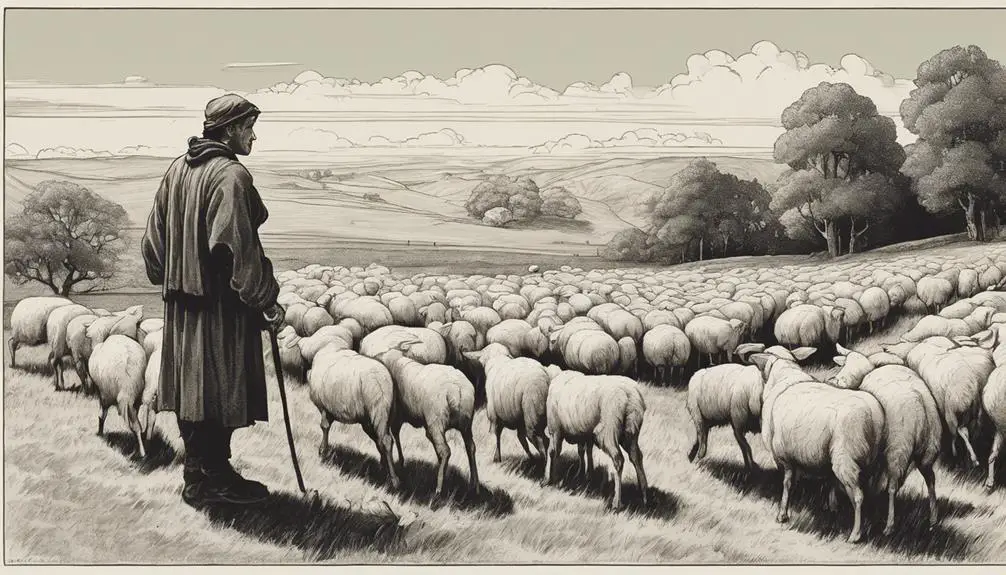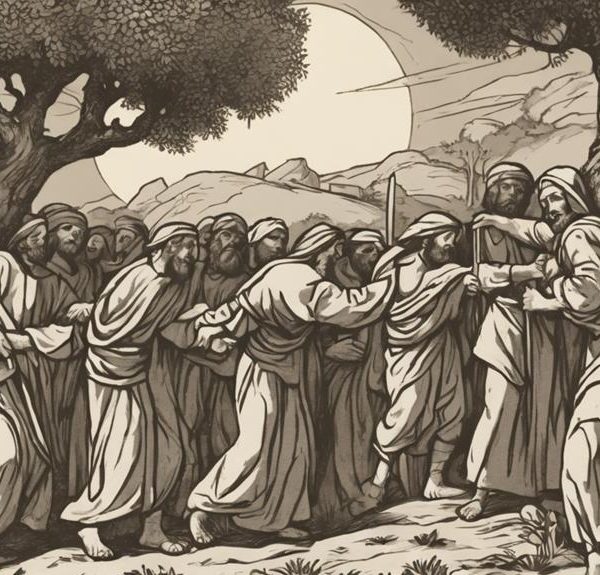Journey into the biblical world to uncover the mysterious role of a hireling, and why their story matters more than you might think.

What Is a Hireling in the Bible
Just as you're exploring ancient texts, you might stumble upon the term 'hireling' in the Bible, a figure often overshadowed by more prominent characters. A hireling, simply put, is someone employed to do menial tasks, notably in pastoral or agricultural settings. This role, however, carries deeper symbolism and interpretation when viewed through the lens of biblical narratives.
It contrasts sharply with the concept of the Good Shepherd, offering rich layers of meaning about faithfulness, responsibility, and spiritual leadership. Unpacking the nuances of this character not only sheds light on historical and cultural contexts but also offers intriguing insights into modern applications of these ancient lessons.
Let's embark on this journey to uncover the significance of the hireling and what it reveals about our understanding of commitment and duty.
Key Takeaways
- Hirelings in the Bible refer to individuals employed for specific tasks, reflecting ancient labor practices and employment ethics.
- Biblical narratives often use hirelings to illustrate principles of generosity, loyalty, and the socio-economic structures of the time.
- Symbolically, hirelings represent transient loyalty and the vulnerabilities of the working class, offering moral teachings on spiritual welfare.
- The contrast between hirelings and the Good Shepherd highlights themes of true leadership, loyalty, and the importance of genuine care and commitment.
Definition and Origins

In the context of biblical literature, 'hirelings' refer to individuals employed for a specific task or period, originating from ancient practices of labor and servitude. This concept, deeply rooted in historical contexts, sheds light on early employment ethics and cultural norms surrounding work and compensation. Understanding hirelings in the biblical era requires you to grasp the societal structures and economic conditions of the time. Employment wasn't just a means to an end but a complex relationship influenced by social status, economic necessity, and cultural expectations.
Cultural norms dictated the treatment and perception of hirelings, often positioning them distinctly from slaves or family members working the land. Unlike slaves, hirelings had a degree of autonomy, choosing whom to work for and negotiating their wages, albeit within the constraints of their socio-economic conditions. This autonomy, however, didn't necessarily translate to better treatment or job security. Employment ethics of the time reflected a pragmatic approach to labor, where hirelings were essential for seasonal agricultural tasks or specific projects but were also easily dispensable. This nuanced understanding of hirelings in biblical times offers insight into the complexities of ancient labor practices, highlighting the interplay between cultural norms and employment ethics.
Role in Biblical Stories

Having explored the socio-economic background of hirelings in the biblical era, let's now examine their presence and significance within biblical narratives. Hirelings, often depicted as laborers or servants, play crucial roles in several stories, providing insights into the cultural context and historical accuracy of the times.
Story |
Role of Hireling |
Significance |
|---|---|---|
Parable of the Vineyard Workers (Matthew 20:1-16) |
Workers hired at different times |
Highlights the kingdom of heaven's principles and God's generosity |
The Good Shepherd (John 10:11-13) |
Contrast to the shepherd, leaves when danger approaches |
Emphasizes the shepherd's commitment and the hireling's lack of loyalty |
Jacob serving Laban (Genesis 29:15-30) |
Serves 14 years for Rachel |
Demonstrates the ancient practices of labor for dowry and familial obligations |
These narratives underline the varying roles hirelings played, from illustrating moral and spiritual lessons to showcasing everyday life and labor practices in biblical times. They not only add depth to the stories but also enhance our understanding of the socio-economic structures that influenced these tales, ensuring the cultural context and historical accuracy are well represented.
Symbolism and Interpretation

Delving into the symbolism and interpretation of hirelings in the Bible, one can uncover layers of meaning that resonate deeply with the spiritual and moral teachings of the scriptures. These figures, often seen as mere workers or servants, hold a wealth of allegorical meanings and cultural implications that go beyond their literal roles.
- Cultural implications: Hirelings reflect the socio-economic realities of ancient times, showcasing the dependence on labor for survival and the vulnerabilities of the working class.
- Allegorical meanings: In biblical narratives, hirelings often symbolize transient loyalty or superficial commitment, contrasting with deeper, spiritual bonds.
- Moral teachings: They serve as cautionary figures, warning against the dangers of prioritizing material gain over spiritual welfare.
- Spiritual interpretations: Hirelings can represent the fleeting nature of worldly attachments in the face of divine calling.
- Human condition: Through the lens of hirelings, the Bible explores themes of duty, responsibility, and the quest for genuine belonging.
Contrast With the Good Shepherd

Exploring the symbolism and interpretation of hirelings further, it's crucial to contrast their roles with that of the Good Shepherd, a figure embodying unwavering loyalty and profound spiritual leadership. The Good Shepherd's loyalty is paramount, representing a dedication that goes beyond mere duty. This figure willingly lays down their life for the sheep, showcasing a depth of commitment and love that starkly contrasts with the hireling's approach.
You'll find the hireling, in contrast, operates from a place of self-preservation. When danger appears, the hireling's fear takes precedence, leading them to abandon the flock. This fear-driven response highlights a fundamental lack of genuine care for the sheep. Unlike the Good Shepherd, whose actions are driven by a deep-rooted sense of responsibility and love, the hireling's connection to the flock is superficial and motivated by personal gain.
This stark contrast between the Shepherd's loyalty and the hireling's fear underlines a broader spiritual and moral lesson. It encourages a reflection on the nature of true leadership and commitment, challenging you to consider the depth of your own loyalty and care for those you're responsible for.
Modern Lessons and Applications

Why should we consider the lessons of the Good Shepherd and the hireling relevant in today's context? The dynamics between the Good Shepherd, representing commitment and care, and the hireling, embodying temporary interest and detachment, mirror contemporary issues in workplace ethics and spiritual employment. These ancient roles shed light on our modern professional and spiritual lives, offering lessons on integrity, dedication, and the value of genuine leadership.
- Workplace Ethics: The contrast encourages a reflection on our own work ethic and the quality of our commitment to our roles.
- Spiritual Employment: It invites us to consider how we engage with our spiritual responsibilities, whether we approach them with the depth of a shepherd or the superficiality of a hireling.
- Leadership and Commitment: Highlights the importance of leaders who are genuinely invested in the well-being of their team, not just the outcomes.
- Community Responsibility: Suggests that each person has a role in nurturing and protecting their community, much like a shepherd does for their flock.
- Personal Integrity: Stresses the value of acting with integrity, even when it might be easier to take a more detached, hireling-like approach.
In essence, the biblical narrative of the Good Shepherd versus the hireling provides a timeless framework for examining our actions and motivations in both our professional and spiritual lives.
Frequently Asked Questions
How Were Hirelings Compensated in Biblical Times, and How Does That Compare to Modern Employment Practices?
In biblical times, hirelings were often compensated with daily wages, akin to today's gig economy workers. Unlike the security of full-time employment, both then and now face uncertainties in income.
However, the modern gig economy amplifies wage disparity trends, making the comparison stark. You're seeing a shift from a simple day's pay for a day's work to complex systems that often disadvantage the worker, highlighting evolving employment practices.
Were There Any Specific Laws or Protections for Hirelings Mentioned in Biblical Texts Outside of Their General Role and Symbolism?
Yes, biblical texts do mention specific laws and protections for hirelings, focusing on their rights and contractual obligations.
You'll find these references particularly in the laws given to the Israelites, which emphasize fair treatment and timely payment.
These ancient norms highlight the importance of respecting the hireling's work and ensuring their well-being, drawing a parallel to today's discussions about workers' rights and the ethics of employment.
Can the Concept of a Hireling Be Found in Religious Texts Outside of the Bible, and How Is It Treated in Those Contexts?
You'll find the concept of a hireling in various religious texts outside the Bible, revealing fascinating cross-cultural parallels.
Comparative mythology shows how different cultures treat hirelings in their sacred narratives, often highlighting similar themes of loyalty, service, and morality.
These stories offer a rich analysis of societal values and the universal nature of certain roles, regardless of the religious or cultural context.
It's a testament to the shared human experience across different traditions.
How Did the Societal Status and Public Perception of Hirelings in Biblical Times Differ From That of Slaves or Servants?
In biblical times, hirelings had a distinct status from slaves or servants, primarily due to their labor rights and potential for social mobility. Unlike slaves, who were owned, hirelings were paid laborers, often reflecting a slightly higher societal position.
Their ability to move between jobs offered a form of social mobility not available to slaves. However, both groups faced societal limitations, the perception and treatment of hirelings were marginally better, given their economic contributions.
In Practical Terms, What Were the Common Tasks or Duties Assigned to Hirelings, and How Did These Vary Across Different Biblical Cultures and Periods?
In discussing your tasks, you'd find agricultural laborers and urban craftsmen frequently employed as hirelings. These roles varied significantly across biblical cultures and periods.
As an agricultural laborer, you'd likely tend to crops and livestock. As an urban craftsman, your duties could range from construction to metalwork, depending on the era and location.
This variability shows the adaptability and essential role you played in the ancient economy.
Conclusion
In conclusion, you've seen how a hireling in the Bible primarily serves as a negative contrast to the devoted, self-sacrificing figure of the Good Shepherd. Unlike the shepherd who genuinely cares for his sheep, a hireling lacks commitment and fails to protect the flock when danger arises.
This distinction not only underscores the importance of genuine leadership and commitment within biblical narratives but also offers you modern lessons on the value of true dedication over superficial service.



Sign up